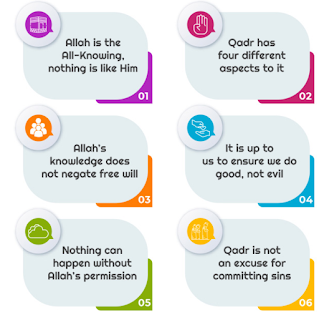Predestination in Islam
Hadith e Jibreel
Belief in Predestination is a must in Islam, its the Sixth Article of Faith, without believing in it ones faith is incomplete. It is clearly stated in Hadith Jibreel:
“............ `Faith is to believe in Allah, His angels, His Books, His Messengers, the Last Day, and to believe in Al_Qadar (the divine will and decree), both good and bad.`…….”
Musnad Ahmad 367, 368 Book 2, Hadith 270
Al_Qadar
For the predestination, word used in Quran and Hadith is Al_Qadar its literal meanings are measuring out, aiming, calculating, preparing, being able, and having power. So Al_Qadar generally means Something which is pre measured e.g. lifespan of humans etc. Al_Qadar is translated into predestination in English language. Predestination was the first issue which aroused in Islamic history and caused early sectarianism. Qadarites, one of the early theologians of Islam, were the ones who believed that humans have absolute free will and Allah SWT has no control over us. They adopted this belief in order to justify Divine Punishment. On the other hand were the Jabarites who believed that humans have no free will and all of their actions are predetermined by Allah SWT.But a question arises if Allah cannot decide our future, then why call upon Allah in prayer? And if we have no control over our actions and fate, why do any good deeds at all? The answer is that both opinions are extremes! Yes Allah has control on our future, nothing can happen if He does not wills it and nothing cannot refrain from happening if He wills it. On the other hand Allah has given us free will by which we can decide our future, He has also given us guidance in the form of Prophets (Peace be upon them all) and revealed Books e.g. Quran-e-Hakim . Allah SWT clearly said that we will go to heaven based upon our good deeds and His Mercy and in Hell based upon our bad deeds and His wrath.
I will respond to this question after a lot of research on this topic. Firstly Allah clearly mentions several times that He created/sent Humans on earth for testing:
“Allah has created death and life to test which one of you is best in conduct.” ―Quran 67:2.
Obviously we cannot accept that Allah says one thing and means something else. Surely Allah means what He says. For a test to be meaningful, the person must not be influenced in any way by the examiner. So, we conclude that in the actions of human beings, Allah does not interfere with his choice. In other words, man performs all his actions according his own will.The ones in the favor of Fatalism say that Hadiths from Holy Prophet PBUH says the same and they quote many hadith which are proved either fabricated or Weak. I'm not a scholar so I will give you some links of scholars proving these Hadith Weak.No doubt guidance is in the hands of Allah SWT and He guides the ones whom he like and misguides whom He likes but He also said in Quran:"and He misleadeth thereby only miscreants"Surah 2:26If some one really needs to get guidance from Allah SWT he just need to be sincere and Allah SWT will surely guide him "In Sha Allah".So in nutshell Islam is against Fatalism and is also against Indeterminism. Holy prophet PBUH himself believed that his actions will influence Allah SWT's judgment this is clear by his PBUH various sayings Narrated ʿAʾisha the mother of the faithful believers:
This is a hadith with a wholly authentic chain. If the Prophet PBUH had been a fatalist, he should have believed that God had already decreed what would be obligatory on the Muslims. Here he acts as if he thinks his choices would affect God’s decrees .


Nice research👍
ReplyDelete